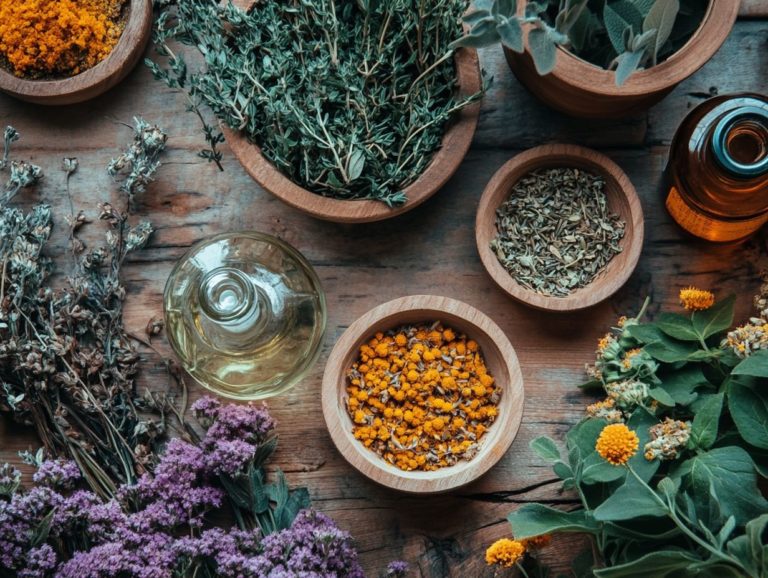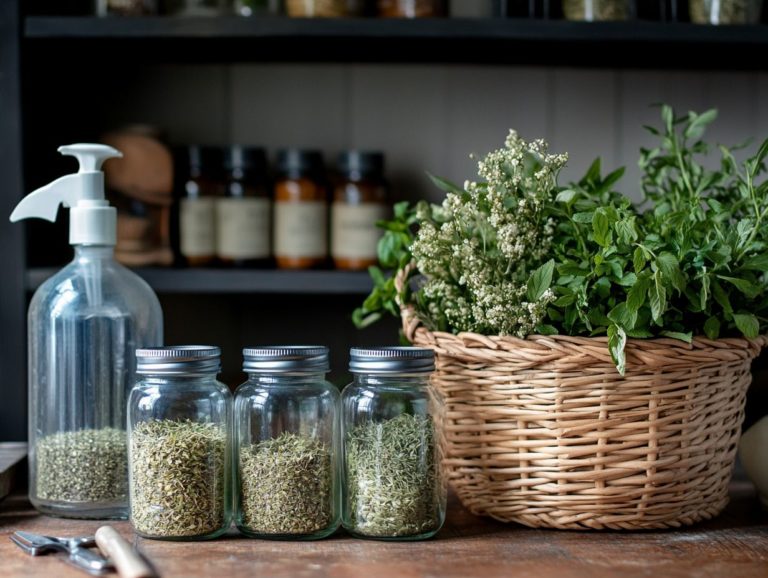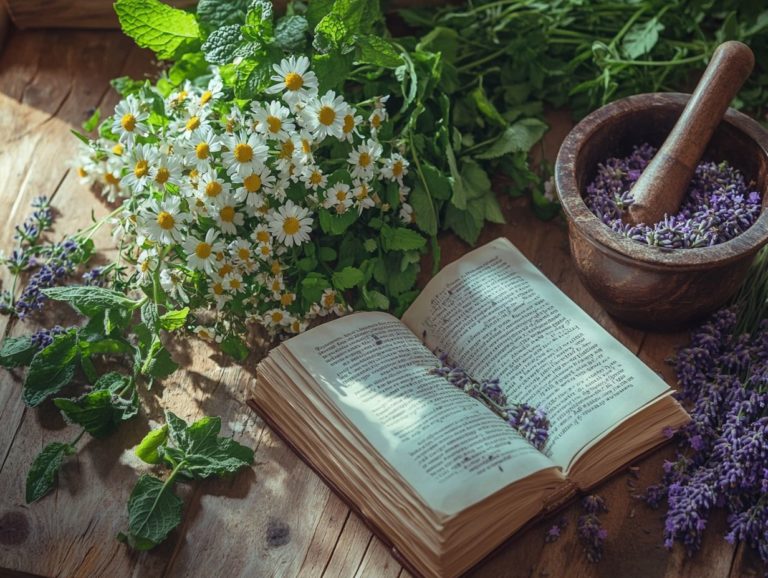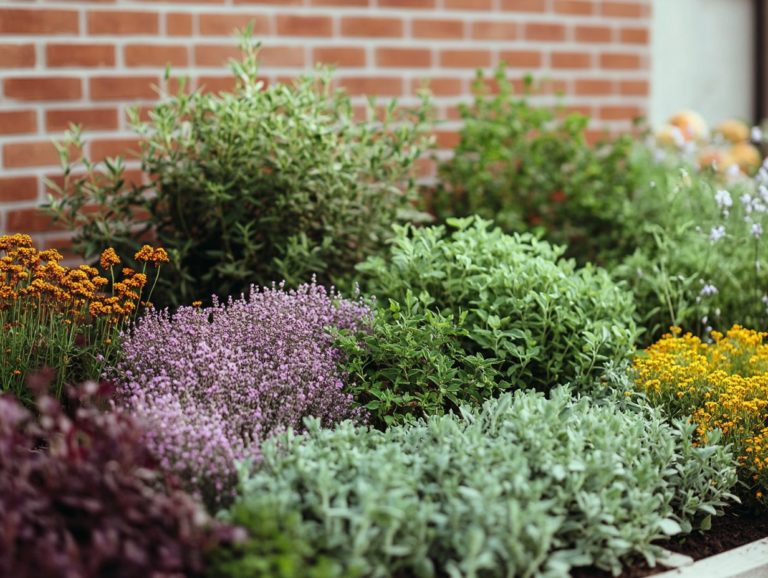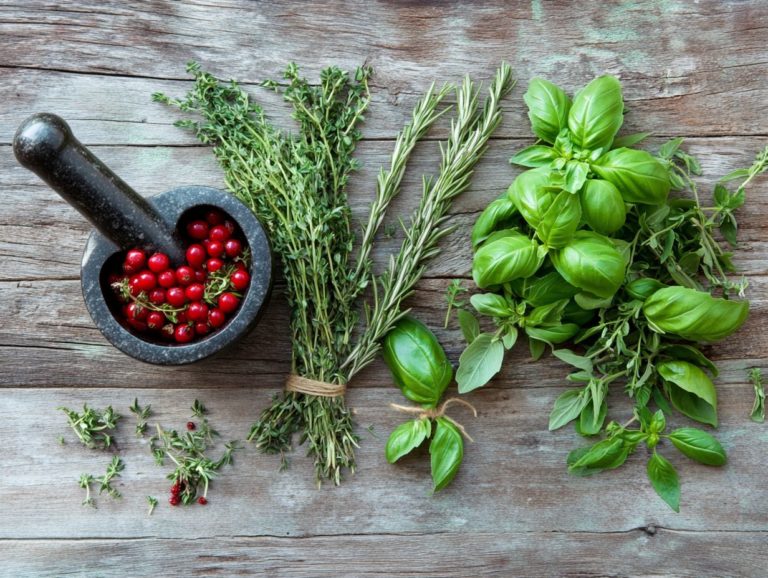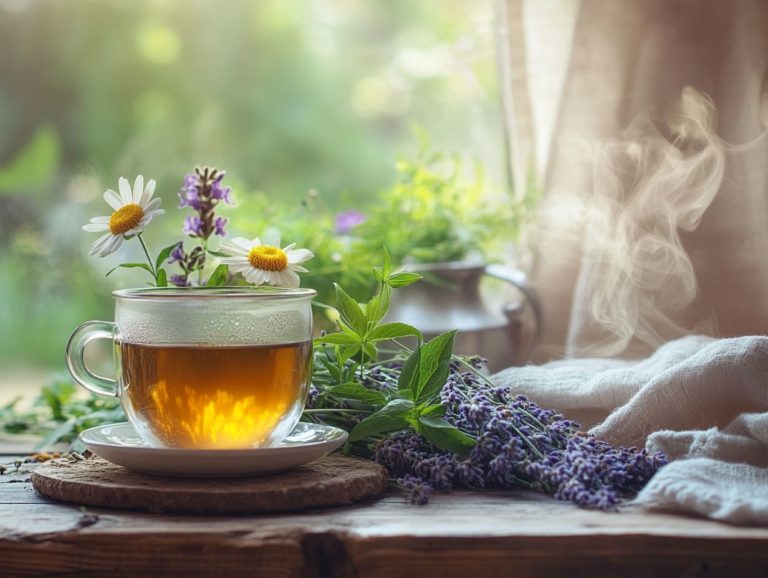How to Create Your Own Herbal Remedy?
Herbal remedies have been revered for centuries, presenting a natural pathway to health and wellness. This includes various home remedies and topical treatments.
Dive into the fascinating world of herbal medicine. This article will guide you through what these remedies entail, their benefits and limitations, and how to select the right medicinal herbs tailored to your specific needs.
It also delves into preparation techniques, proper usage, and storage. You’ll find essential safety precautions to consider, particularly when using essential oils and homemade remedies.
By the conclusion, you’ll possess practical tips to seamlessly integrate herbal remedies into your daily routine, enhancing your natural lifestyle.
Contents
- Key Takeaways:
- Understanding Herbal Remedies
- Choosing the Right Herbs
- Methods of Preparing Herbal Remedies
- Using and Storing Herbal Remedies
- Proper Dosage and Storage Tips
- Safety and Side Effects
- Precautions and Possible Adverse Reactions
- Incorporating Herbal Remedies into Your Lifestyle
- Frequently Asked Questions
- What is a herbal remedy and why should I create my own?
- What are the basic steps for creating a herbal remedy?
- What are some common herbs used in herbal remedies?
- How can I ensure the safety and effectiveness of my herbal remedy?
- Are there any precautions I should take when making my own herbal remedy?
- Can anyone create their own herbal remedy?
Key Takeaways:
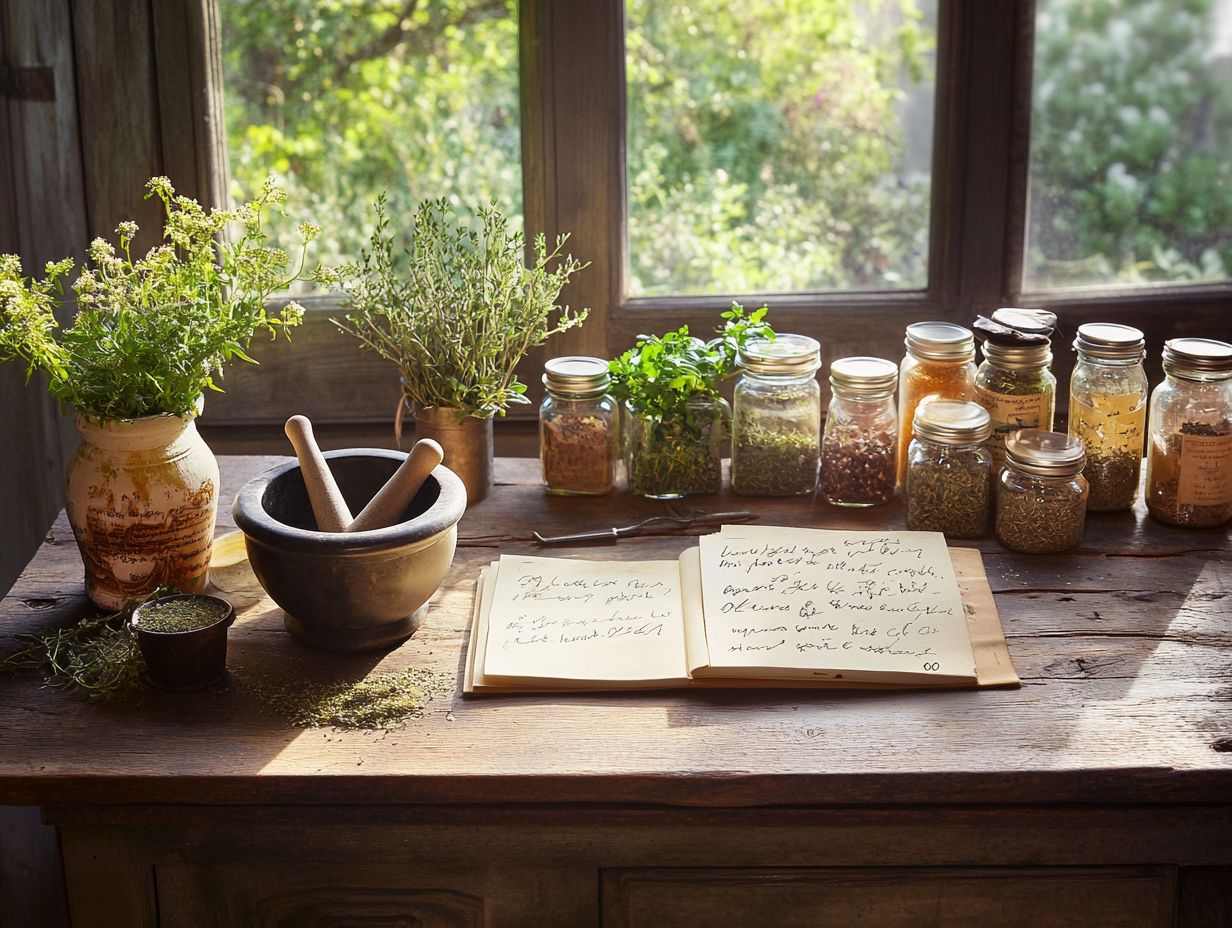
- Understand the benefits and limitations of herbal remedies before incorporating them into your health routine.
- Consider factors such as your health condition, allergies, and the potency of herbs when choosing the right ones for your remedy.
- Proper dosage, storage, and precautions are important for safely using herbal remedies and avoiding adverse reactions.
Understanding Herbal Remedies
Understanding herbal remedies is essential for anyone interested in embracing a natural lifestyle. This knowledge connects you to nature’s healing benefits and the art of utilizing medicinal herbs.
For centuries, various cultures have turned to herbal remedies as effective treatments for common ailments. These remedies encompass a myriad of preparations such as teas, infused oils, salves, and balms, along with the use of essential oils.
By exploring this knowledge, you can discover the health benefits these natural solutions offer. Easy-to-grow herbs like cilantro and spearmint empower you to make informed decisions about your well-being while cultivating a deeper appreciation for the plants that can enrich your life.
What are Herbal Remedies?
Herbal remedies are your go-to natural treatments derived from medicinal herbs. They are often embraced in traditional healing practices, like those taught by an herbalist, to ease various health conditions.
These time-honored solutions utilize the healing benefits of plants thriving in diverse settings. For example, calendula, with its radiant orange blooms, is cherished for its anti-inflammatory and skin-healing qualities.
This makes it a favorite for topical use on cuts and burns, as well as a key ingredient in many skincare products. Likewise, chamomile, renowned for its calming effects, offers relief from digestive issues and encourages relaxation.
This makes a soothing tea an essential home remedy. Delving into these herbal options showcases their versatility and reveals a connection to wellness and healing traditions that span the globe.
Benefits and Limitations
Herbal remedies offer an array of health benefits. From the soothing properties of infused oils to the medicinal advantages of well-known herbs like echinacea and lemon balm, these remedies have various uses in homemade treatments.
However, it s also important to understand their limitations. Take echinacea, for example; it’s celebrated for its potential to boost immune function during cold and flu season.
On the other hand, lemon balm is revered for its calming effects, often used to alleviate anxiety and enhance sleep quality. Herbs like rosemary and thyme can also enhance flavor while offering their own health benefits.
It’s vital to recognize that not all herbal treatments are suitable for everyone. If you have specific health conditions or are taking medications, proceed with caution, as interactions may arise.
The potency of these remedies, whether in the form of teas or topical treatments, can vary depending on preparation methods and quality. Consulting a healthcare professional before weaving these natural solutions into your wellness routine is a wise move.
Start exploring herbal remedies today and unlock nature’s healing power!
Choosing the Right Herbs
Selecting the ideal herbs for your herbal remedies, like calendula and lavender, is crucial. Consider the specific growing conditions and the unique health benefits each plant offers.
The guidance of an herbalist teacher is invaluable, especially for beginners learning to grow herbs and understand their healing properties.
Factors to Consider
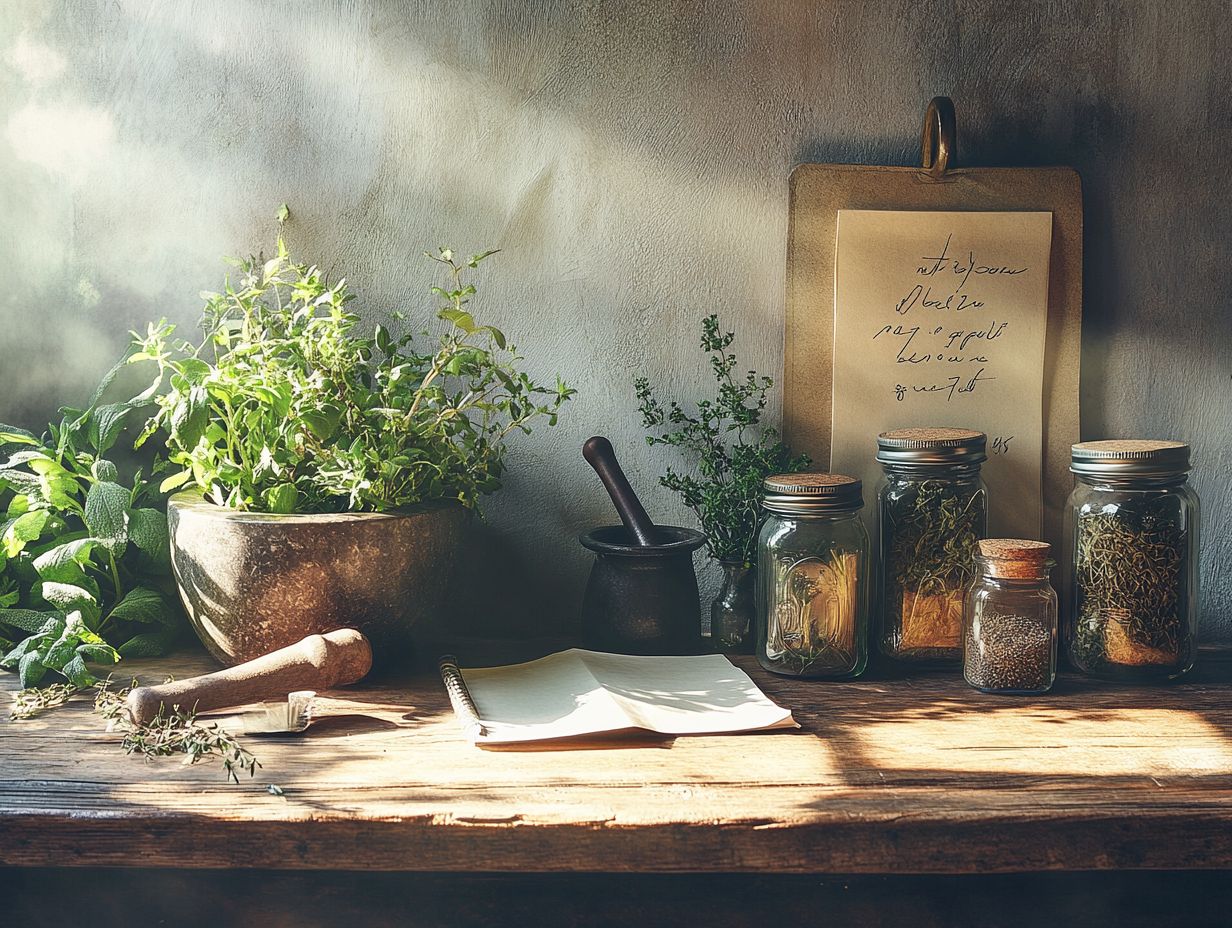
When selecting herbs, consider key factors like the health benefits you’re after, the ideal growing conditions for each herb, and your own gardening experience.
To cultivate a thriving herb garden, pay attention to soil type. The right soil influences growth, flavor, and potency, especially for aromatic herbs like rosemary and thyme.
Some herbs prefer well-draining sandy soils, while others thrive in rich, loamy conditions. Most herbs need at least six hours of direct sunlight daily to flourish.
Knowing how much water each herb requires is key to keeping them healthy. Insights from experienced herbalist teachers can help you create an optimal growing environment.
Methods of Preparing Herbal Remedies
Preparing herbal remedies can be simple or intricate. Methods like making oils, salves, and balms showcase the unique healing properties of herbs.
Different Techniques and Recipes
Transforming medicinal herbs into effective remedies offers personalized approaches to health. Techniques such as creating oils made by soaking herbs in oil allow you to harness nature’s power at home.
For example, infusing olive oil with lavender and chamomile creates a soothing oil for skin irritations.
To make this infused oil, gently heat the herbs in olive oil for several hours, then strain the mixture for clarity to enjoy its full benefits.
If you want relief from muscle tension, make a balm with calendula and beeswax. These methods enhance your well-being and connect you to the rich tradition of herbalism.
Using and Storing Herbal Remedies
Properly utilizing and storing herbal remedies is essential for their effectiveness. Neglecting dosage or storage practices can diminish their health benefits.
Prioritizing proper methods allows you to fully harness the power of these natural remedies.
Proper Dosage and Storage Tips
Knowing the right dosage and storage tips for herbal remedies is essential. This helps you gain their full health benefits and avoid potential side effects.
You ll find that various forms of herbal preparations think teas, tinctures, powders, and capsules come with their own unique dosing guidelines that deserve careful consideration. For example, tinctures are typically more concentrated, meaning you often need smaller amounts compared to loose powders or teas, especially when preparing oils made by soaking herbs.
As you incorporate these remedies into your daily routine, it’s also vital to be mindful of specific storage techniques to maintain their effectiveness, especially for oils made by soaking herbs. Keep your herbs in airtight containers and away from direct sunlight to preserve their potency over time. Be aware of expiration dates and whether certain preparations need refrigeration to enhance safety and effectiveness. For more detailed guidance, consider crafting your own herbal remedies at home to ensure your homemade solutions remain potent.
Safety and Side Effects
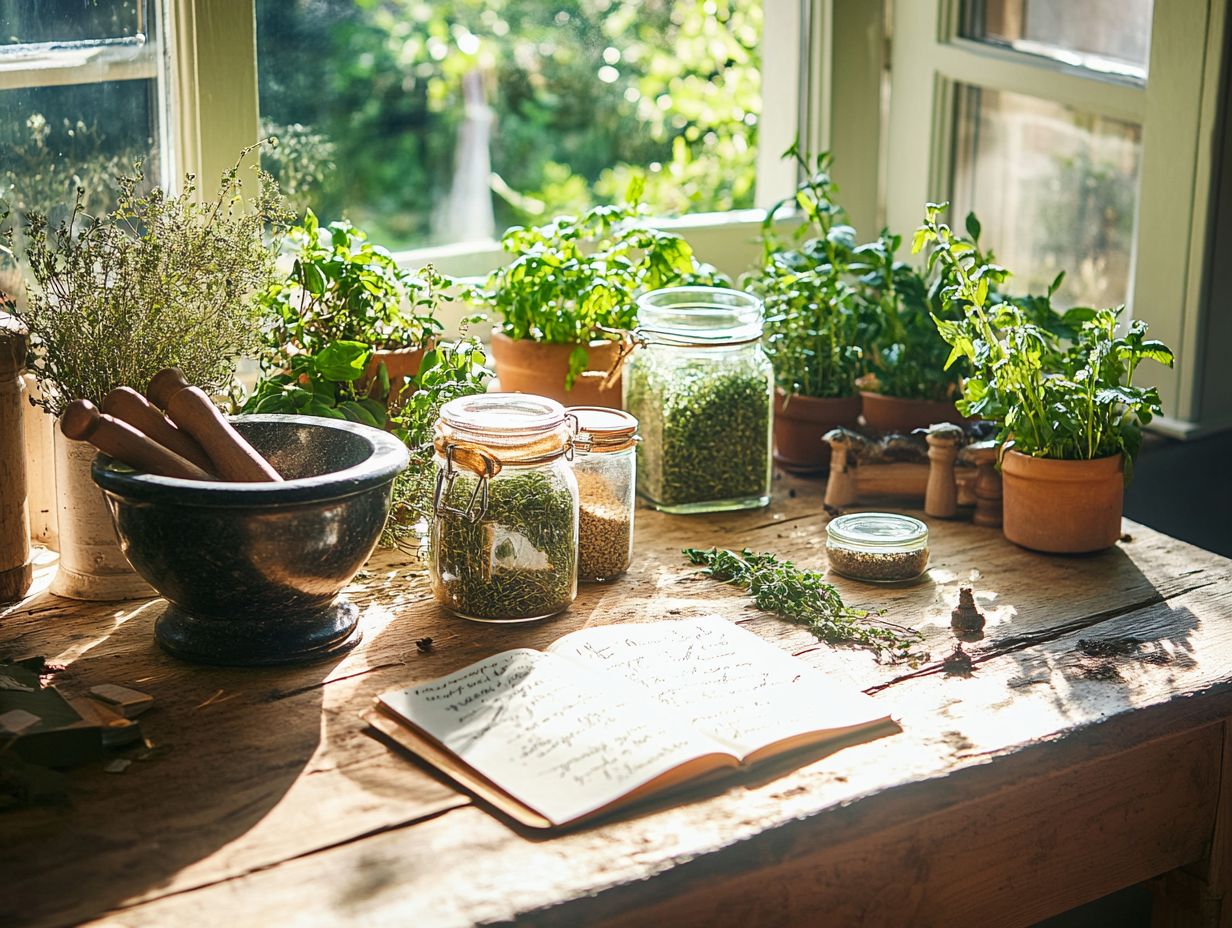
Safety and unwanted effects are paramount considerations when it comes to herbal remedies. Certain herbs can lead to unwanted effects and may interact with medications, highlighting the necessity of understanding the precautions essential for their safe use.
It s crucial for you to be well-informed and cautious to ensure a beneficial experience with these natural alternatives, especially when engaging in your creative love for herbalism.
Precautions and Possible Adverse Reactions
When using herbal remedies, it s essential to exercise caution, as certain herbs can indeed lead to unwanted effects. Understanding these risks, especially with topical treatments, is crucial for ensuring both safe and effective treatment.
Many people may not realize that while these natural solutions often present health benefits, they can interact with prescription medications or worsen existing conditions. Don’t wait; consult a healthcare professional before adding herbs to your routine, especially if you have liver issues or allergies. Additionally, it’s important to know how to store herbal remedies properly, particularly with potent herbs like echinacea.
For example, be aware that St. John’s Wort might interfere with antidepressants, while herbs like ginseng could elevate blood pressure in some users. This highlights the importance of understanding the medicinal benefits and potential side effects of all herbal remedies. By staying informed about the potential side effects and interactions of herbal remedies, including interactions with essential oils and topical treatments, you can enhance both the safety and efficacy of your herbal practices. To learn more about making these remedies, check out this guide on how to create herbal tinctures easily.
Incorporating Herbal Remedies into Your Lifestyle
Bringing herbal remedies into your life can truly transform your wellness journey! Easy-to-grow options like Calendula and Chamomile present an array of health benefits that elevate your approach to wellness.
By embracing these natural lifestyle solutions, you enhance your daily routine with a richer, more holistic perspective on well-being.
Tips for Incorporating Herbal Remedies into Daily Routine
To seamlessly weave herbal remedies into your daily routine, consider practical strategies like sipping on herbal teas for hydration, applying topical treatments (creams or ointments applied to the skin) to soothe your skin, and experimenting with home remedies to unlock various health benefits.
Integrating these natural elements, such as medicinal herbs, can be simple. Even small changes can lead to significant enhancements in your health and overall well-being. For example, beginning your day with a cup of chamomile tea can promote relaxation and help calm an anxious mind. Additionally, exploring DIY herbal remedies for common cold relief can further support your wellness journey.
You might also find it beneficial to create a soothing paste using aloe vera and essential oils for their soothing properties to tackle skin irritations, offering both immediate relief and ongoing care. Infusing olive oil with garlic can elevate your meals and boost your immune system.
These subtle adjustments not only enrich your daily life but also help you connect more closely with medicinal plants and nature’s therapeutic offerings.
Watch our video contest featuring Jen Bredesen from the California School of Herbal Studies for more insights on herbal remedies.
Frequently Asked Questions
What is a herbal remedy and why should I create my own?
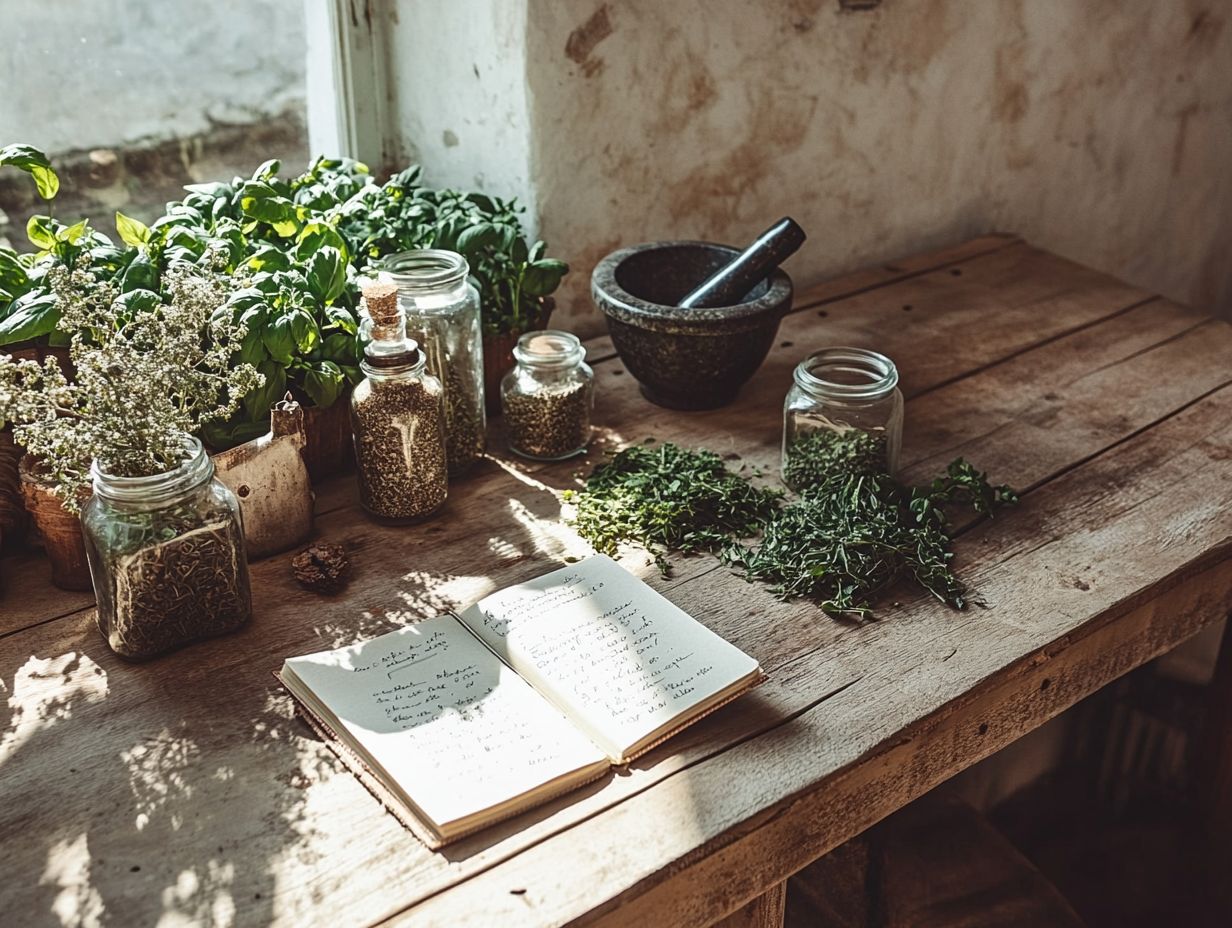
Creating your own herbal remedy can provide insight into the healing properties of medicinal herbs and empower you to personalize your health journey.
A herbal remedy is a natural treatment made from plants and herbs that can help alleviate various health issues. Creating your own herbal remedy allows you to have control over the ingredients and ensure that it is made with quality, organic materials.
What are the basic steps for creating a herbal remedy?
The basic steps for creating a herbal remedy include:
- Identifying the health issue you want to address,
- Researching the best herbs for that issue,
- Sourcing high-quality herbs,
- Preparing the remedy, and
- Properly storing it.
What are some common herbs used in herbal remedies?
Some common herbs used in herbal remedies include:
- Ginger,
- Garlic,
- Chamomile,
- Echinacea,
- Lemon balm, and
- Thyme.
These herbs have been used for centuries for their healing properties and can be easily incorporated into your own herbal remedy.
How can I ensure the safety and effectiveness of my herbal remedy?
To ensure the safety and effectiveness of your herbal remedy, it is important to:
- Research and source high-quality herbs,
- Follow recommended dosages, and
- Consult with a healthcare professional if you are taking any medications or have underlying health conditions.
Are there any precautions I should take when making my own herbal remedy?
When making your own herbal remedy, it’s crucial to be aware of the medicinal herbs you choose and their potential interactions. Proper storage is also important to maintain their potency.
Yes, there are a few precautions to keep in mind when making your own herbal remedy. For instance, it’s important to be aware of the most common herbal remedies and their potential effects.
- Always properly research and identify the herbs you are using,
- Some herbs may interact with medications or underlying health conditions, and
- Follow proper storage and expiration guidelines to maintain the potency of your remedy.
Can anyone create their own herbal remedy?
While anyone can create their own herbal remedy, it is important to approach it with caution and proper research, especially regarding skincare and first aid applications. If you have any allergies or health concerns, it is recommended to consult with a healthcare professional before creating your own herbal remedy.

